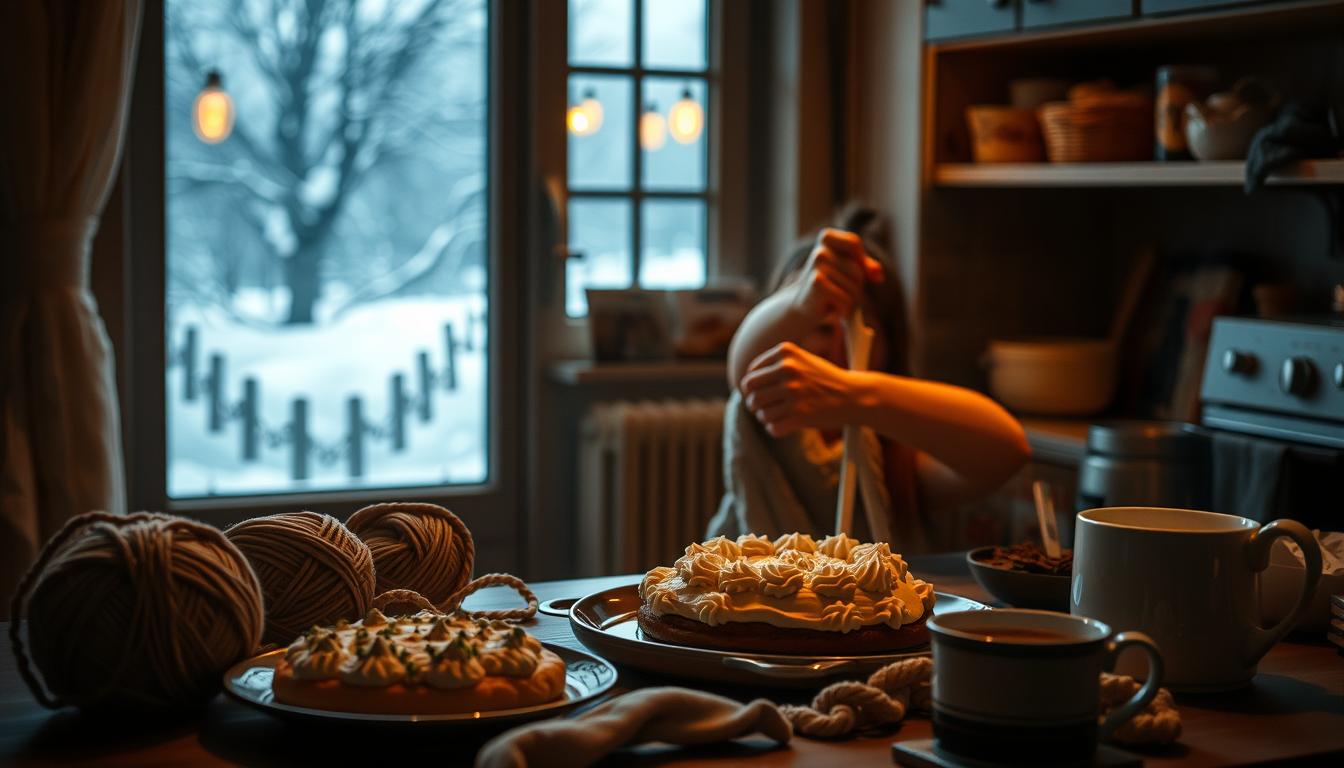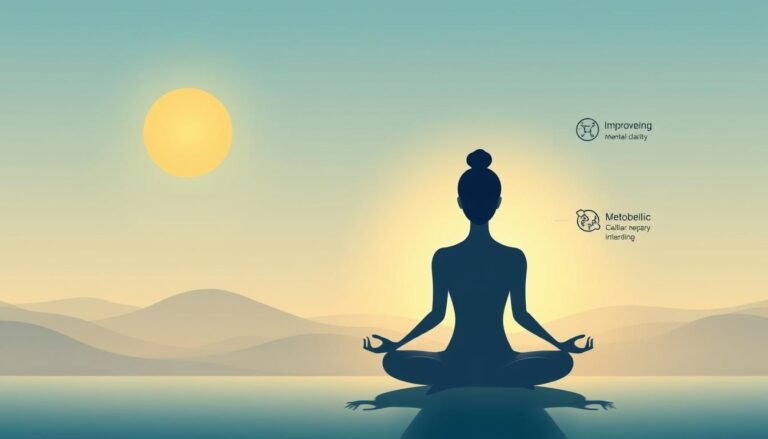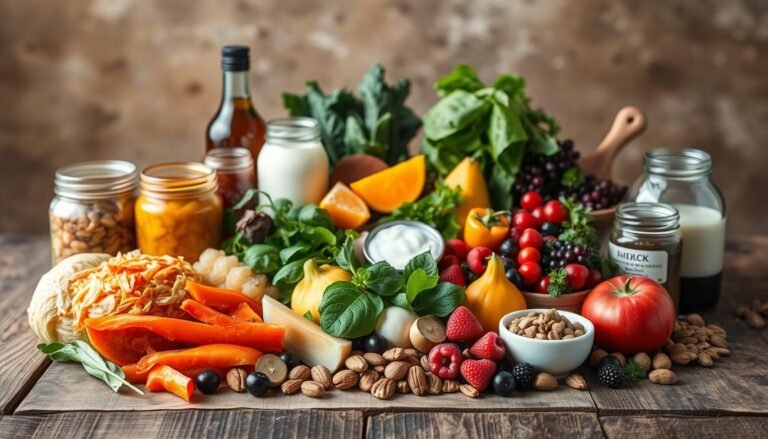Did you know 62% of Americans feel overwhelmed by digital demands? Our grandmothers knew the secret to calmness. Grandma hobbies that boost mental health are back, helping us relax in today’s fast world.
Knitting and baking are more than old-fashioned hobbies. They’re powerful for emotional wellness, mixing creativity, mindfulness, and stress relief. As our lives speed up, we’re finding joy in grandma’s old-fashioned crafts.
These activities do more than offer a break. They help us feel less anxious, clearer-minded, and create something real with our hands. Knitting and baking are changing how we care for our mental health.
Key Takeaways
- Traditional hobbies offer significant mental health benefits
- Knitting and baking can reduce stress and anxiety
- Hands-on activities provide a digital detox alternative
- Crafting connects us to meaningful, creative experiences
- Mental wellness can be found in simple, repetitive tasks
The Resurgence of Traditional Hobbies in Modern Life
In today’s world, where screens and constant connection rule, people are finding joy in slower, more meaningful activities. Cozy crafts are becoming a key way to fight stress. They offer a chance to connect with simpler times through creativity.
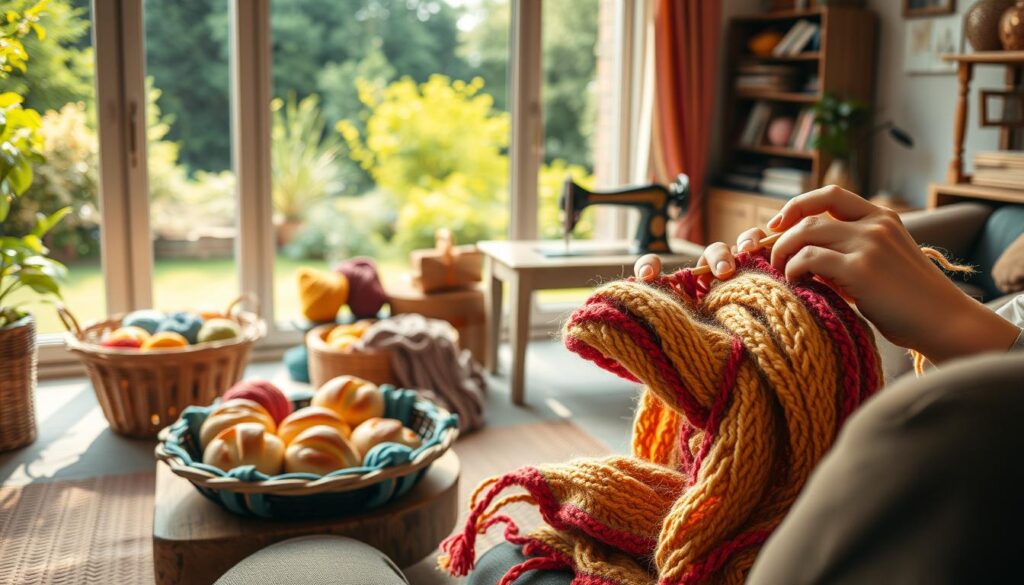
The rise of digital life has led to a big change in how we relax and take care of our minds. Now, more people are looking for activities that make them feel truly accomplished and calm.
Why Old-Fashioned Activities Are Making a Comeback
- Provide tangible mental health benefits
- Offer a break from digital overwhelm
- Create opportunities for mindful engagement
Traditional hobbies are great for our brains because they use many skills at once. Activities like knitting and baking are not just fun. They also help our brains relax and reduce anxiety.
The Digital Detox Movement and Nostalgic Pastimes
More people are choosing to leave their tech behind and enjoy activities their grandparents loved. Crafting is seen as a way to fight back against too much digital noise.
| Traditional Hobby | Mental Health Benefit | Stress Reduction |
|---|---|---|
| Knitting | Improved Focus | High |
| Baking | Sensory Engagement | Medium-High |
| Gardening | Mindfulness | High |
Understanding the Appeal of Slower-Paced Activities
These old-time hobbies are more than just fun. They offer a safe space away from the fast pace of digital life. By taking up creative hobbies, people can find peace and control again.
Embracing ‘Grandma’ Hobbies: Knitting, Baking, and Mental Health
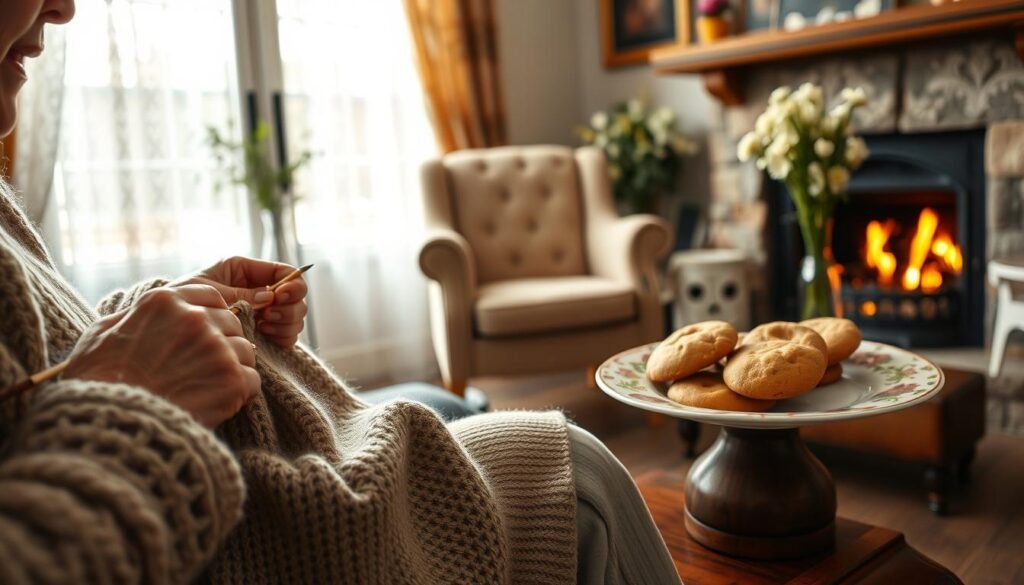
In today’s fast world, old hobbies like knitting and baking are back in style. They’re not just for fun anymore. They’re also key to improving our mental health.
“Slow hobbies for fast lives are the new self-care revolution” – Craft Wellness Magazine
These classic crafts do more than entertain. They help us relax and focus away from digital distractions. By doing slow hobbies, we can:
- Lessen anxiety with soothing actions
- Make something real and valuable
- Focus on the moment
- Feel proud of what we’ve made
Knitting and baking are more than skills. They’re ways to heal our minds. Spending time on these activities helps us find peace and strength in a busy world.
Whether you’re making bread or a scarf, these hobbies connect us to our creativity. They offer a deep sense of self-expression that tech can’t match.
The Science Behind Knitting and Mental Wellness
Crafting is more than just a hobby—it’s a powerful tool for mental health. Knitting is a standout comfort hobby that offers more than just clothes. It changes our brain chemistry and boosts our emotional well-being.
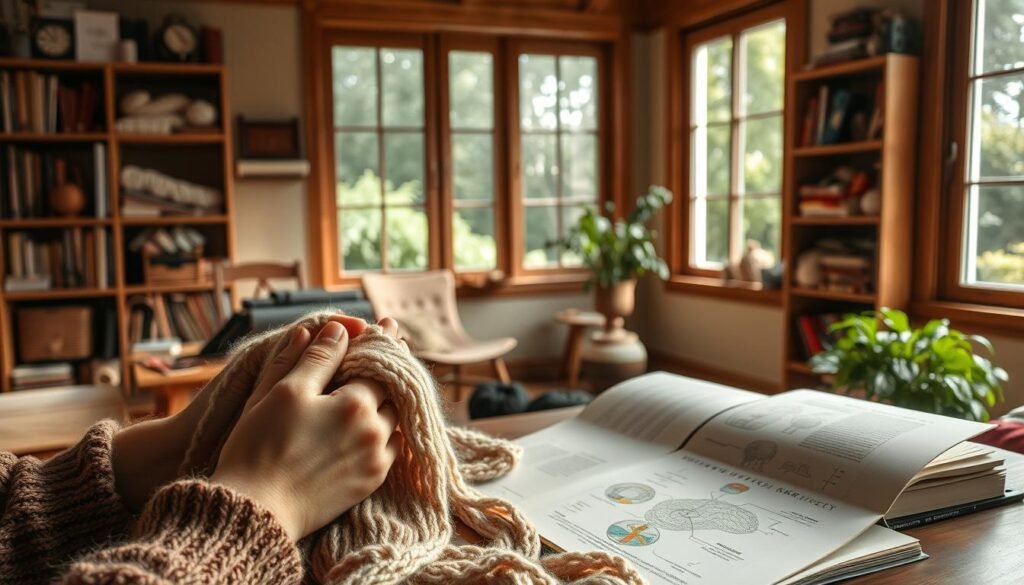
Neurologists found that knitting’s repetitive motions trigger special brain responses. These activities stimulate certain brain paths, leading to a meditative state. This state helps with mental health recovery.
How Repetitive Motion Transforms Brain Chemistry
Knitting changes your brain in amazing ways:
- It boosts serotonin and dopamine levels.
- It lowers cortisol (the stress hormone).
- It improves focus and brain function.
“Knitting is like a natural antidepressant that you create with your own hands.” – Dr. Sarah Reynolds, Neuroscience Researcher
Stress Reduction Through Yarn Work
Knitting acts as a form of active meditation. Like baking from scratch, it involves repetitive, mindful actions. These actions calm our nervous system.
Building Neural Pathways Through Consistent Practice
Regular knitting strengthens brain connections. It supports mental health recovery by:
- Boosting fine motor skills.
- Improving spatial reasoning.
- Giving a sense of accomplishment.
By taking up these comfort hobbies, people can change their mental landscape, one stitch at a time.
Baking as Therapy: More Than Just Comfort Food
Baking is more than just a hobby; it’s a powerful way to relax, inspired by grandma. It turns a simple kitchen task into a deep wellness practice. When flour meets hands, creativity blooms.
Baking is a wellness ritual that offers many mental health benefits. It’s not just about making tasty treats. The act of measuring, mixing, and seeing something beautiful come to life is like meditation.
- Reduces stress through repetitive motions
- Creates a sense of accomplishment
- Promotes mindfulness and present-moment awareness
- Allows creative self-expression
Studies show baking boosts positive feelings in our brains. The rhythmic movements and focused attention can lower cortisol levels. This helps us deal with anxiety and emotional ups and downs.
Baking isn’t just about food—it’s about nourishing the soul and creating moments of pure, simple joy.
Whether it’s kneading dough or decorating cookies, baking connects us to our past. It offers a peaceful escape from the digital world.
How Traditional Crafts Combat Modern Anxiety
Finding peace in our fast-paced world is hard. Traditional crafts are a strong way to fight the constant digital noise. They are not just old-time activities but key for our mental health.
Mindfulness Through Manual Activities
Knitting and baking are great for mindfulness. Knitting, in particular, is calming. Its repetitive actions soothe the mind and lower stress.
- Reduces stress through repetitive movements
- Creates a sense of accomplishment
- Provides a break from digital stimulation
Creating Focus in a Distracted World
Baking and mindfulness go hand in hand. The act of making something real focuses your mind. It blocks out distractions and helps you concentrate.
The Therapeutic Value of Tangible Results
Crafting gives us something digital can’t: real, physical proof of our work. A handmade scarf or a warm loaf shows our skills and creativity.
Crafting is not just a hobby, it’s a form of active meditation that reconnects us with our inner calm.
The Social Benefits of Grandma-Inspired Hobbies
Home-based hobbies are changing how we connect and find balance in 2025. Activities like knitting, baking, and handcrafting help us build social bonds and clear our minds.
Cozy self-care rituals are now a chance to connect with others. These hobbies open doors to social interaction through different ways:
- Local crafting circles and community workshops
- Online crafting communities and virtual meetups
- Intergenerational skill-sharing platforms
- Social media craft exchange groups
Handcrafting does more than share skills. It creates emotional support networks that fight off loneliness.
| Hobby Type | Social Connection | Mental Health Impact |
|---|---|---|
| Knitting | High | Stress Reduction |
| Baking | Medium | Mood Enhancement |
| Pottery | Medium-High | Creative Expression |
Crafting communities offer more than shared skills—they provide emotional landscapes where individuals can find understanding, support, and genuine human connection.
Incorporating Slow Hobbies into Daily Life
Adding traditional hobbies to your life can change your daily routine and mental health. Grandma habits offer a calm break from our busy digital lives. By making time for creative activities, you can find peace and balance.
Creating Sustainable Crafting Routines
Building a hobby habit needs planning. Find times in your day for creative work. Even a short 15-30 minutes can improve your mental health and skills.
- Choose a specific time of day for your hobby
- Prepare materials in advance
- Create a dedicated workspace
- Track your progress with a hobby journal
Balancing Modern Schedules with Traditional Pastimes
You don’t have to change your whole life to add slow hobbies. Small, consistent steps can fit creative routines into your busy schedule.
| Time Slot | Potential Activity | Estimated Duration |
|---|---|---|
| Morning | Knitting | 15 minutes |
| Evening | Baking | 30-45 minutes |
| Weekend | Craft Project | 1-2 hours |
Setting Realistic Goals for Hobby Development
Start your hobby journey with kindness to yourself. Setting reachable goals keeps you motivated and avoids feeling overwhelmed. Begin small, celebrate your wins, and enjoy learning new skills.
“Creativity is allowing yourself to make mistakes. Art is knowing which ones to keep.” – Scott Adams
From Stress to Success: Building Skills Through Traditional Crafts
Traditional crafts are more than just fun activities. They help us grow and improve our mental health. Knitting and baking are not just skills; they change us for the better.
Knitting does more than just make clothes. It changes our brains and helps us learn important skills. Every stitch is a victory, making us feel proud and in control.
- Develop patience and concentration
- Improve fine motor skills
- Create tangible evidence of personal growth
- Reduce anxiety through structured activity
Baking also has great benefits for our minds. It’s about the joy of creating something tasty. It makes us feel good by releasing happy chemicals in our brains.
“Crafting isn’t just a hobby—it’s a journey of self-discovery and healing.”
By taking up these old-time activities, we can turn stress into success. We build strength and resilience through creativity and practice.
The Physical Health Benefits of Knitting and Baking
Grandma hobbies like knitting and baking are more than just old-fashioned fun. They offer surprising health perks that can boost your overall well-being. These hobbies are great for your mental health and have unexpected benefits for your body, linking old crafts to modern wellness.
These activities do more than just entertain. Every stitch and knead helps your body in amazing ways.
Fine Motor Skills and Arthritis Prevention
Knitting and baking can make your hands stronger and more agile. These hobbies give your fingers and hands a gentle workout. This can help:
- Keep joints flexible
- Lessen hand stiffness
- Slow down motor skill loss with age
- Maybe even stop arthritis early
Active Meditation Through Movement
Repetitive motions in knitting and baking act like a form of physical meditation. The rhythmic actions work your body in a gentle way. This boosts blood flow and eases muscle tension.
Cardiovascular Benefits of Standing and Kneading
Baking and knitting keep you moving and standing, which is good for your heart. These activities help:
- Boost blood flow
- Engage muscles lightly
- Improve body movement
- Reduce sitting time
By taking up these traditional crafts, you’re not just making something nice. You’re also caring for your health through fun, meaningful activities.
Creating Your Own Cozy Corner: Setting Up for Success
Turning a small area into a hobby haven can change your mental health. Old-fashioned hobbies are coming back because they create a calm, creative space.
Find a quiet spot in your home that feels welcoming. Natural light is great for activities like knitting. Here are key things for your hobby area:
- Comfortable seating with good support
- Adequate lighting for detailed work
- Storage solutions for craft supplies
- Inspirational decorations that motivate you
Creating a cozy kitchen nook for baking can also help reduce stress. Keep your baking tools handy, display cookbooks, and add music for a relaxing vibe.
“Your hobby space should feel like a personal retreat, not another chore to manage.” – Craft Wellness Expert
Your cozy corner doesn’t have to be big. Even a small, organized space can be your wellness haven.
Mindful Making: The Connection Between Craft and Mental Clarity
Self-care hobbies are changing how we think about mental health. Crafting is becoming a key way to find emotional balance. It offers a break from the digital world we live in. Slow living trends in 2025 show how hands-on activities help clear our minds.
Mindful making is more than just a hobby. It’s a way to care for our mental health through creative activities. Activities like knitting, painting, or ceramics create a calm space. They help our minds relax and refresh.
- Reduces stress through focused attention
- Promotes mindfulness and present-moment awareness
- Provides a sense of accomplishment
- Creates neural pathways that support emotional regulation
The science behind crafting’s mental health benefits is interesting. Doing crafts releases dopamine, which makes us feel good. Crafting acts like meditation, fighting anxiety and depression with real, meaningful tasks.
“In a world of constant digital stimulation, crafting offers a rare moment of genuine connection with ourselves.” – Mental Health Research Institute
By taking up these hobbies, we start healing rituals for ourselves. As we look to 2025, slow living will keep showing the value of mindful, intentional practices. These practices are key for our mental and emotional health.
Conclusion
Traditional hobbies like knitting and baking are more than just fun. They help us fight off the stress of our digital world. These hobbies bring us back to a slower pace, improving our mental and physical health.
Choosing cozy hobbies isn’t about avoiding tech. It’s about finding a balance. Activities like knitting or baking can change how we care for ourselves. They give us moments to connect and find peace in a busy world.
Starting a craft journey can be healing and personal. It helps with anxiety, lets you express yourself, or just slows you down. Begin with something simple, be kind to yourself, and enjoy the process of creating.
Maybe your wellness journey starts with yarn, a bowl, or a craft. Take back your peace, one step at a time.

